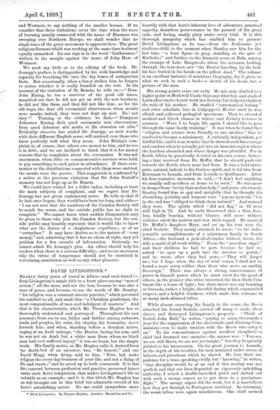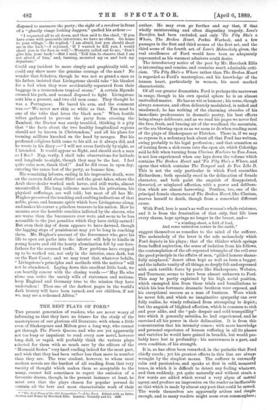DAVID LIVINGSTONE.
NEARLY thirty years of travel in Africa—and such travel !- form Livingstone's ample title to a front place among " men of action ;" all the more, and not the less, because he was also a man of peace, and because, to use the words of Mr. Stanley, " his religion was a constant sincere practice," which governed his conduct to all, and made him " a Christian gentleman, the most companionable of men and indulgent of masters." And that is his characteristic, which Mr. Thomas Hughes has so thoroughly understood and portrayed. Throughout his vast journeys from sea to sea, hither and thither among unknown lands and peoples, his calm, his charity, his humanity, never forsook him ; and when, standing before a drunken native, raging at an Arab outrage, "the Doctor, baring his arm, said he was not an Arab, but a white man from whom no black man had ever suffered injury," it was no boast, but the simple truth. His family motto, as Mr. Hughes calls it, derived from the death-bed of an ancestor, was, " Be honest ;" and one David Hogg, when dying, said to him, " Now, lad, make religion the every-day business of your life, and not a thing of fits and starts ;" and he acted up to both commands. It is this fine concord between profession and practice, preserved intact under such fierce temptation, that makes Livingstone's life so valmble as an example ; and it is this which Mr. Hughes has so will brought out in this brief but admirable record of his hero's astonishing career. No one could sympathise more • Arid Livingstone. By Thomas Miens. London : Macmiran and Co. heartily with that hero's inherent love of adventure, practical sagacity, dauntless perseverance in the pursuit of his great ends, and loving, manly piety under every triaL It is this thorough sympathy which has enabled him to present David Livingstone as he was,—from the frolicsome yet studious child, to the moment when Stanley saw him for the last time, " a bent figure in gray, standing at the gate of Kwihaha ;" and further, to the dramatic scene at Bala, among- the swamps of Lake Bangweolo, where his servants, looking through the tent-door, saw " the Doctor kneeling by the bed, his face buried in his hands on the pillow, dead." The volume is an excellent instance of miniature biography, for it gives us what we seek in such a book—a sketch of his deeds, but a picture of the man.
His strong points came out early. He not only climbed to a higher point on Bothwell Castle than any other boy, and studied Latin after twelve hours' work in a factory, but helped to lighten the toils of his mother. He studied " astronomical botany " and other cabalistic lore in Culpepper's Herbal until he was afraid, and collected geological specimens. Then he attended medical and Greek classes in winter, and divinity lectures in summer. " Were I to begin life again, I should like to pass through the same hardy training." It was when he found that "religion and science were friendly to one another," that he resolved to become a missionary. A curiously independent, yet dutiful life; and it is no wonder that he showed such fine courage and conduct when he actually got into an immense region where the heathen abounded and where danger was plentiful. For in. South Africa he practically decided on his own course, better- ing a hint received from Dr. Moffat that he should push out towards the North, where none had been. It was a bold enter- prise, natural, indeed, to his fearless spirit, and it led him from Kuruman to Loanda, and from Loanda to Quillimane. After his first tentative incursion, he said,—" I don't feel anything we usually call sacrifices at home to be such." He was more in danger from "levity than melancholy;" and years afterwards, Stanley found him so gay and sprightly, that he thought his abounding joviality and humour were " joyous hysteria," but in the end was "obliged to think them natural." And natural they were. The spirits which " did not flag " in '43 were still high in '72. And he early discovered that a firm, fear- less, kindly bearing, without bluster, still more without violence, awed the natives and won their regard. He married Dr. Moffat's daughter Mary, and set up his tent near the chief Sechele. They nearly attained, he wrote, "to the indis- pensable accomplishments of a missionary family in South Africa,—the husband a jack-of-all-trades without doors, the wife a maid-of-all-work within." From the "guardian angel" and their children he had to part, because he had re- solved " to open up a path into the interior or perish ;" and he wrote, after they had gone,—" They will forget me ; but I hope when the day of trial comes, I shall not be found a more sorry soldier than these who serve an earthly Sovereign." There was always a strong consciousness of power in himself, power which he must exert for the good of others, in the pioneer who twice traversed the then Dark Con- tinent like a beam of light; but there never was any boasting or bravado, rather a bright, cheerful daring which commanded respect, and a helpful kindness which made him welcome to so many dark-skinned tribes.
While absent escorting his family to the coast, the Boers attacked his friend Sechele, carried off many to make them slaves, and destroyed Livingstone's property. " Think of foolish John Bull," he writes, " paying so many thousands a year for the suppression of the slave-trade, and allowing Com- missions even to make treaties with the Boers who carry it on." To his remonstrances against needless slaughter—a chief had drowned two enemies—the answer was : " You see, we are still Boers, we are not yet taught;" but they frequently yielded to his intercession. On his great journey to Loanda, in the depth of his troubles, his men mutinied under stress of labours and privations which he shared. He bore their im- pudence for a time, speaking civilly, but " knowing," he writes, " that discipline would be at an end if this mutiny was not quelled, and that our lives depended on vigorously upholding authority, I seized a double-barrelled pistol and darted out with such a savage aspect as to put them to a precipitate flight." The savage aspect did the work, but it is marvellous how they got through to Portuguese territory. In returning, the worst tribes were again mischievous. One chief seemed disposed to massacre the party; the sight of a revolver in front of a " ghastly visage looking daggers," quelled his ardour :— "I requested all to sit down, and then said to the chief, If you have come with peaceable intentions, we have no other. Go home to your village.'—He replied, I am afraid, lest you should shoot me in the back '—I rejoined, If I wanted to kill you, I would shoot you in the face as well.'—Mosantn called out to me, Don't give him your back.'—But I said, Tell him to observe that I am not afraid of him,' and, turning, mounted my ox and took my departure."
Could any incident be more simply and graphically told, or could any show more the genuine courage of the man P No
wonder that Sekeletu, though he was not so grand a man as his father, insisted that Livingstone should take " his blanket for a bed when they were accidentally separated from their baggage in a tremendous tropical storm." A certain Mpende crossed his path, and seemed disposed to fight. Livingstone sent him a present, and two old men came. They thought he was a Portuguese. He bared his arm, and the comment was :—" We never saw skin so white as that. You must be one of the tribe that loves the black men." When hostile tribes gathered to prevent the party from crossing the Zambesi, the Doctor was sorely troubled, thinking it a pity that " the facts about the two healthy longitudinal regions should not be known in Christendom," and all his plans for teeming millions knocked on the head by savages. But his profound religious faith came to his aid, as it always did, and he wrote in his diary :—" I will not cross furtively by night, as I intended. It would appear as flight, and should such a man as I flee ? Nay, verily, I shall take observations for latitude and longitude to-night, though they may be the last. I feel quite calm now, thank God!" And he did cross in open day, entering the canoe last of the party, as became him.
His remaining labours, ending in his impressive death, were on the eastern field about Shire and the great lakes, where the Arab slave-dealer worked such havoc, and still works, almost uncontrolled. His long, toilsome marches, his privations, his physical sufferings, are well told; but most of all has Mr. Hughes preserved the touching and evslting indications of that noble, pious, and humane spirit which bore Livingstone along, and makes his career a priceless treasure to his nation. How he mourns over the horrible cruelties inflicted by the slavers, who are worse than the buccaneers ever were, and seem to be less accessible to the just penalties which they have richly earned But even their day of doom appears to have dawned, though the lagging steps of punishment may yet be long in reaching them. Mr. Hughes's account of the forerunner who gave his life to open out paths into the interior will help to kindle in young hearts and old the hearty abomination felt by our fore- fathers for the accursed traffic. New problems have cropped up to be worked out, not only in the interior, once dark, but on the East Coast ; and we may trust that, whatever befalls, " Livingstone's principles and methods with the natives" will not be abandoned. Laying down this excellent little book, we can heartily concur with the closing words May He who alone can order the unruly wills of statesmen and nations, keep England and Germany true to the mission they have undertaken ! Then one of the darkest pages in the world's dark history will have been turned, and our children, if not we, may see a redeemed Africa."



































 Previous page
Previous page